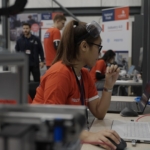By Helen Yeulet, Director of Competence and Compliance, BESA (Building Engineering Services Association)
The Refrigeration, Air Conditioning & Heat Pumps (RACHP) industry is evolving rapidly. From the shift to low-carbon refrigerants to the increasing use of smart technology and AI-driven diagnostics, innovation is at the heart of progress. But who is driving this change? Alongside legislation changes, more often than not, it’s the next generation of engineers—young professionals bringing fresh ideas, new technologies, and modern ways of working into the sector.
At BESA, we know that the future of RACHP depends on nurturing this new wave of talent. One of the most exciting ways we’re seeing young engineers demonstrate their skills is through WorldSkills UK, a competition that not only showcases technical excellence but also encourages forward-thinking solutions to industry challenges.
How Innovation is Changing RACHP
The demand for sustainable heating and cooling has never been greater. With governments introducing stricter environmental rules and businesses looking for more energy-efficient solutions, the industry is evolving to keep up. One big change is the move towards greener refrigerants, replacing older gases that contribute more to global warming with environmentally friendly options like hydrocarbons, CO₂ and ammonia. At the same time, smart technology is making heating and cooling systems more efficient, using artificial intelligence and connected devices to monitor and optimise performance. There is also a growing focus on reducing energy waste, with engineers finding new ways to recycle heat and improve efficiency, making systems more cost-effective and sustainable. Another major shift is the move towards electric heating, with heat pumps becoming a popular alternative to gas boilers, helping the UK progress towards its Net Zero goals. Young engineers entering the industry are learning these cutting-edge technologies from the start, making them well-placed to lead the sector into the future.
The Role of WorldSkills UK in Driving Innovation
WorldSkills UK is more than a test of skill—it’s a platform for exploring new technologies and improving industry standards. Competitors are challenged to solve real-world RACHP problems, often using the latest equipment and methods. By doing so, they develop an innovative mindset, learning to think creatively about how to improve efficiency, safety, and sustainability in their work.
Past competitors have gone on to become industry leaders, using their experience to push the boundaries of what’s possible. The competition is a launchpad for new ideas, helping to introduce modern approaches into workplaces across the UK.
BESA’s Support for the Next Generation of Innovators
At BESA, we understand the importance of innovation, which is why we are committed to supporting the industry in a variety of ways. Through the BESA Academy, we provide specialist training to ensure engineers have access to the latest industry knowledge. We work closely with employers to support apprenticeships and help develop essential skills for the future. Encouraging young professionals to take part in competitions like WorldSkills UK is another way we inspire them to challenge themselves and explore new technologies. Additionally, we actively promote sustainability and Net Zero initiatives, helping the industry grow in a way that aligns with environmental goals.
How Employers Can Support Young Innovators
Investing in young engineers isn’t just good for business—it’s essential for the future of the RACHP industry. Supporting training programmes, offering apprenticeships, and encouraging skills development helps ensure the workforce keeps pace with technological advancements. By embracing the fresh ideas and energy of young professionals, the industry can drive innovation, improve sustainability, and remain at the cutting edge. Nurturing new talent today will help build a smarter, more sustainable future for the RACHP sector.
If you’re competing in Refrigeration, Air Conditioning & Heat Pumps or have a learner or apprentice participating, don’t forget the deadline to complete entry stage tasks is 2 May!


